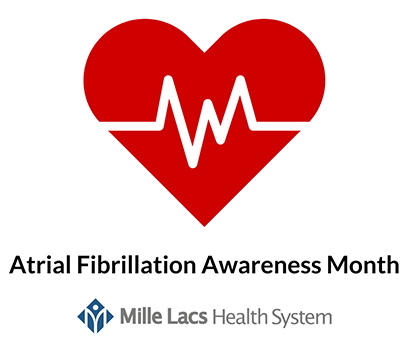Atrial Fibrillation Awareness Month
August 31, 2023
September is Atrial Fibrillation Month. Atrial fibrillation, often called AFib, is the most common type of treated heart arrhythmia. An arrhythmia is when the heart beats too slowly, too fast, or in an irregular way. Atrial fibrillation is an irregular and often very rapid heart rhythm.
During atrial fibrillation, the heart's upper chambers — called the atria — beat chaotically and irregularly. They beat out of sync with the lower heart chambers, called the ventricles. Episodes of atrial fibrillation may come and go, or they may be persistent.
Instances of atrial fibrillation are on the rise in the United States. The CDC estimates that between three million – and six million Americans currently have AFib, and by 2030 that number is likely to reach twelve million. The risk of developing AFib increases with age.
Many people with AFib don’t even know they have it. Some of the symptoms to watch for include: irregular heartbeat, heart palpitations (rapid, fluttering, or pounding), dizziness, extreme fatigue, shortness of breath, chest pain, reduced ability to be physically active, and confusion.
If left untreated, AFib can lead to other health complications such as: blood clots in the heart, stroke, heart failure, chronic fatigue, and reduced blood supply to the organs. According to the American Heart Association, AFib is linked with a five times higher risk of stroke, two times higher risk of dementia, and three times higher risk of heart failure.
Although many cases of AFib stem from problems in the heart’s actual structure, there are a number of lifestyle habits that can trigger AFib. Some of these lifestyle habits include: drinking too much alcohol or caffeine, illegal drug use, smoking, and stress. Other health conditions can also increase your risk of AFib such as: diabetes, thyroid disease, high blood pressure, sleep apnea, and obesity.
If you have a concern about your heart health or are experiencing any of these symptoms, please reach out to your medical provider. You can schedule an appointment for any one of the five Mille Lacs Health System Clinic locations (Onamia, Isle, Garrison, Hillman, & Milaca) by calling 320-532-3154.
